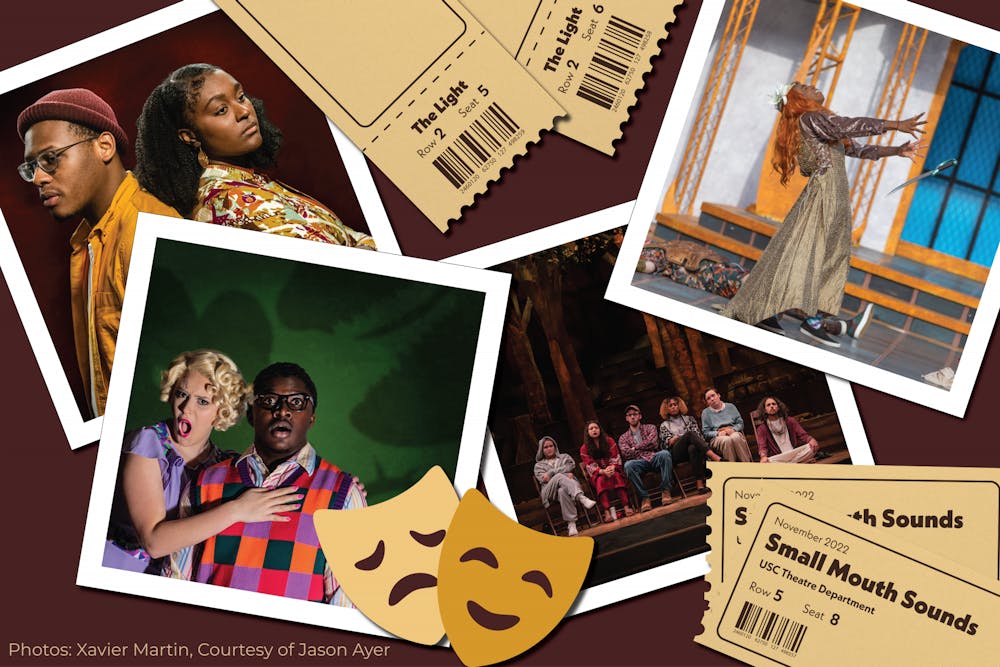Over the past year, the USC Theatre Department has produced five shows. From breezy comedies to contemporary dramas, these shows feature a range of styles and subjects, highlighting the versatility of the department and its actors.
"A Midsummer Night's Dream"
The season began last October with "A Midsummer Night’s Dream," a Shakespearean comedy. Directed by Devin Haqq, the play follows several storylines, including four young lovers who run away to avoid arranged marriage, a fighting fairy king and queen and a group of craftsmen who are trying to rehearse a play. The stories each include magical consequences, such as complicated love spells and dangerous transfigurations.
Rowland Marshall, a second-year theatre student, played Oberon, the king of the fairies, and said the show was altogether an extensive learning experience.
This production featured two new elements: It was performed outdoors on a stage specifically built for the show by the university and Folger Theatre, and it swapped the parts of the fairy king and queen. Typically Oberon casts a spell on Titania, but, in this production, it is Oberon who falls in love with Bottom, a man turned into a donkey.
“It felt like a top-secret mission,” Marshall said. “It was very experimental. It didn't feel like it was all planned out at any moment, and I felt like we were all kind of solving it together.”
"Small Mouth Sounds"
"Small Mouth Sounds," written by Bess Wohl, ran last November. In sharp contrast to "Midsummer," which uses complex language, "Small Mouth Sounds" follows six characters who attend a silent retreat, meaning the play takes place almost entirely without words.
Carly Siegel, a fourth-year theatre student, played Joan, a sex therapist who attends the retreat with her partner, Judy. To play her character without words, Siegel relied on her physicality and connections with the actors on stage as well as the retreat teacher's voice, which is the show's only source of dialogue.
“The big thing was that it was active listening. If we zoned off onstage while the teacher is speaking to us, then we're going to miss an opportunity, or we're not going to react, and that's going to slow down the play,” Siegel said.
The 10 Minute Play Festival
The 10 Minute Play Festival, produced in February, took a very different form from the department's other productions.
Rather than one show, this festival put five 10-minute plays together, each directed by a different member of the theatre faculty. These plays ranged from comedies to dramas, giving theatre students the chance to shine across genres.
Marshall was cast in "The Bear," by Anton Chekov and directed by Dustin Whitehead, where he played Smirnov, a Russian debt collector who comes to collect from a woman who’s husband recently died. Although the premise initially sounded grim to Marshall, he said it was rewarding to find the comedy in his character.
“I had this idea of this wounded animal, kind of really tormented guy, but I had to find the comedy (and) the lightheartedness in it,” Marshall said. “And it's much more rewarding, because I think all that anger and stuff is really easy to do. But the soft stuff, that’s what’s difficult.”
"The Light"
"The Light," produced in March, featured just two actors. The play follows a recently-engaged Black couple who confront their different ideas on issues of sexism and racism.
Shakori Jennings-Shuler, a graduate student studying for her masters of arts in teaching in theatre, played Genesis, a school principal who has to navigate the challenges of being a Black woman in today’s world.
The play is primarily a debate between the couple over the intersection of racism and rape culture. The couple debates what it means to support artists in light of accusations, whose accusations are believed and how it affects the community. The two characters address familiar concerns, ones that Jennings-Shuler said struck a nerve with her and her friends.
“The fact that women will be seen and heard with my literal lines, I just think there's so much power behind that," Jennings-Shuler said. "And I think that our department choosing this show just means a lot, because I think more people need to see it than they think they need to see it.”

"Little Shop of Horrors"
To close out the 2022-2023 season, the theatre department produced its first musical, "Little Shop of Horrors." The show is a horror-comedy where Seymour, a poor employee at a plant shop, meets an alien plant that boosts the store’s sales but feeds on human blood.
Siegel plays Chiffon, one of the street urchins that serve as a doo-wop chorus.
“There’s space stuff, there’s bejeweled dresses, there’s bright colors, there’s a man-eating plant, there’s a sadist dentist,” Siegel said. “It’s very entertaining.”
Siegel said the shift from a mostly silent play to a musical wasn't very jarring. Aside from a longer rehearsal process, she said many of the same techniques for a silent performance are useful for a musical.
“(In) 'Little Shop,' you use your physicality a lot in that, too,” Siegel said. “Because of our lack of lines, we're still reacting and we're watching everything, so we have to be, once again, present on stage.”
Looking back at her USC theatre career, Siegel said she loved the variety in the shows she’s been in.
“I've had just so many favorite shows. Each show is so incredibly different and unique,” Siegel said. “I am incredibly lucky to have gotten all the roles and have done everything that I have done at USC.”

